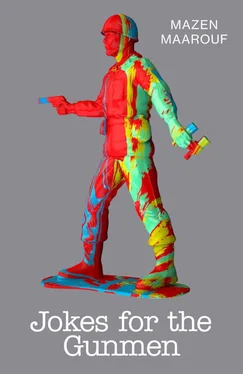MY MOTHER WAS SITTING QUIETLY IN THE BACK seat. I was telling my wife a joke and driving the car. We were on our way to the care home, taking my mother back after her day out with us. My mother stays at the care home six days a week. Alzheimer’s. The car was travelling at fifty miles an hour. This is not just a detail. I never found out whether my wife got the joke or not, since she didn’t have a chance to laugh. Just as I finished telling the joke, we saw an old man crossing the motorway on the other side. When you’re travelling at high speed, sudden death looks like it’s happening in slow motion.
I stopped the car, of course, like a number of other people, and with my wife’s help I got my mother out of the car and left her to watch the scene from behind the concrete barrier. The old man was truly amazing. He was hopping nimbly between the vehicles, avoiding one car, dodging and weaving, whirling around, spinning like a wheel, doing the splits and throwing feeble punches. I kept my mother and my wife at a safe distance so that the old man wouldn’t touch us with his boxing gloves and turn us into biscuits. The old man’s gloves grew bigger and bigger whenever he touched the side of a car and turned it into a biscuit. My wife tried to say something to the old man, but I nudged her with my elbow and she realized she should keep silent. As for my mother, her eyes drank in the whole scene, especially when I started describing it to her in precise detail, with the enthusiasm of a sports commentator: ‘He’s touching the side of a car and turning it into a biscuit.’
The old man didn’t look anxious. He stepped out into the motorway between the speeding cars, then took off his white hat and wrapped it around his fist like a boxing glove. He didn’t want to punch the cars, just to touch them. The speeding cars tried to avoid him, but they didn’t succeed. Every car he touched turned into a giant biscuit. Since they were going so fast, they overturned and crumbled into pieces by the side of the road. The scene was riveting to watch as the first three groups of cars passed. Soon there was a giant pile of biscuit crumbs on the side of the road.
Later, on the way to the care home, my wife said with a smile that she would have liked to ask the old man just one question. I didn’t comment. We reached the door of the care home. I got my mother out of the car and, as I handed her over to a beautiful nurse, I whispered in her ear, ‘Mum, tell the nice lady the story about the old man.’ And Mother did then launch into a monologue about the biscuits as she went off with the nurse. I heard the latter saying, ‘And what else happened?’ My mother fell silent because she could no longer remember, and the nurse then suggested, ‘How about giving you an injection to help you remember the rest of the story?’
This is what I usually do with my mother: I present her with a story once a week. Last week we were alone – my wife wasn’t with us. I stopped the car in front of a biscuit seller. He’s a boy who carries on his back an enormous canvas bag full of giant biscuits that he sells by the kilo. They’re the kind of biscuits used for making desserts at home. He targets cars with elderly women, confident they are mothers.
He came up to the car window, saying to my mother, ‘Madam, would you like some biscuits? Take one and give me whatever you like for it.’ But my mother didn’t answer. She didn’t know for a moment what the boy was talking about. ‘Mum,’ I said. ‘Biscuits – you know what biscuits are, don’t you?’ But she didn’t answer. I asked the boy to get a biscuit out of his bag and show it to her. ‘It’s a massive biscuit, isn’t it, Mum?’ I said. My mother smiled at the sight of the giant biscuit. ‘That one’s half the size of the bonnet of the Renault 5 that I’m driving,’ I said. Then I added that the boy had other biscuits, some of them the size of tiles and some as big as a classroom blackboard.
Mother could no longer make the delicious desserts she had been so good at making during the war. Baking a cake requires intense concentration and in some cases determination as well. My mother would carry on in the midst of bombing raids and when the neighbours and their children were shouting. She’d tell us to go down to the shelter with Father while she stayed in the kitchen. She’d join us only when her cake was ready, and her cakes always had biscuits as the main ingredient, because it was cheaper than filling them with chocolate, cream or fruit. My father loved cake with biscuits.
In the care home my mother would sometimes throw a tantrum and tell her doctor that it was me who made up all these stories. The doctor summoned me several times to ask me whether what she said was true. I denied it of course. I’d say that my mother had Alzheimer’s and that’s all there was to it. It was Alzheimer’s that made her confused and led to these accusations. She said, ‘The old man was dead and covered in blood. He’d made a desperate attempt to block the motorway, but a car ran him over. I didn’t see any biscuits.’ But she’d add that she wasn’t certain about this, and then she’d collapse, so they would give her an injection to tranquillize her.
I know my mother doesn’t have Alzheimer’s. My mother also knows that. And maybe the doctor does too. But I pay the care-home bills regularly, including those for the Alzheimer’s treatment. Not so that my mother will stay in the care home, but to try to make sure she goes on believing in the biscuit story. I visit my mother every Wednesday as well as at the weekend. I stay with her for an hour or an hour and a half. My mother doesn’t say anything when I tell her that the old man that I showed her is still on the motorway. ‘He has his white gloves on and he’s touching the cars. Some of the drivers have tried to crash into him, including a soldier in an army jeep. All of them have ended up as biscuits. So far no one’s been able to get him off the motorway. And the old man is just as you saw him the first time, Mum. He darts between the cars. He hops around on one leg. He spares one car. He dodges and weaves. He spins around. They tried using tranquillizer darts on him, but he dodged them all. Warning shots weren’t any use either. The sight of the old man is now so commonplace that people no longer stop on the side of the road to watch – except for tourists, who take pictures or videos of the old man on their phones. There were three big fire engines on the side of the motorway today. Whenever the old man turns a car into a biscuit, the firemen immediately spray the biscuit with their hoses to soak it and free the people inside.’ Then my mother asked, ‘Don’t you think that the old man who turns cars into biscuits looks like your father?’ My mother is talking about my father, though there has been no trace of him for more than twenty years, ever since he packed his bags at the end of the war, claiming he was going off for some sporting event. My mother still goes to the window every day and curses him out loud, so much so that it’s annoying for the neighbours and embarrassing for me.
Every weekend my wife and I go past the old man on the motorway. My mother sits in the back of the car. There comes a moment when I watch my mother in the rear-view mirror, whispering, ‘The old man’s coming closer now, to touch our car.’ At that point my wife automatically exclaims, ‘Hey, old man, now are you satisfied?’ My mother is now convinced that whenever the old man hears this, he freezes, which gives us a chance to escape. Sometimes a police patrol car draws alongside us and one of the policemen asks us why we’ve stopped in the middle of the motorway, and my wife and I have an argument. I don’t approve of revealing any details of this story to anyone except my mother, and whenever it’s her day out I do everything I can to make her think we’re going to bake a cake in the kitchen.
Читать дальше












